Key takeaways:
- Ethical investing aligns financial choices with personal values, emphasizing the broader impact on society and the environment.
- Long-term financial performance is often enhanced by ethical investments, debunking the myth that doing good compromises returns.
- Engagement in shareholder advocacy and a clear investment mandate are effective strategies for ethical investing.
- The future of ethical investing is promising, with rising awareness and demand for sustainability and corporate accountability among younger generations.
Understanding ethical investing
Ethical investing, at its core, is about aligning your financial choices with your values. I remember one time, sitting down with a friend who was torn between investing in companies with strong ethical practices and those with high returns but questionable operations. It really struck me how deeply our values shapes our decisions, especially in a world where our investments can either contribute to positive change or perpetuate harm.
The landscape of ethical investing has evolved significantly, encompassing various strategies like socially responsible investing (SRI) and environmental, social, and governance (ESG) criteria. These approaches allow investors to scrutinize not only financial performance but also the broader impact of their investments. Have you ever stopped to think about the kind of legacy you’re building with your portfolio? It’s more than just numbers; it’s about the change you want to see in the world.
One of the most powerful aspects of ethical investing is its capacity to foster a sense of community. I felt that sense of belonging when I joined an investment group focused on renewable energy. Sharing insights and strategies with like-minded individuals reinforced the idea that our investments could be a force for good. Can investing really create a better world? From my experience, the answer is a resounding yes, as it connects us with a purpose beyond profit.
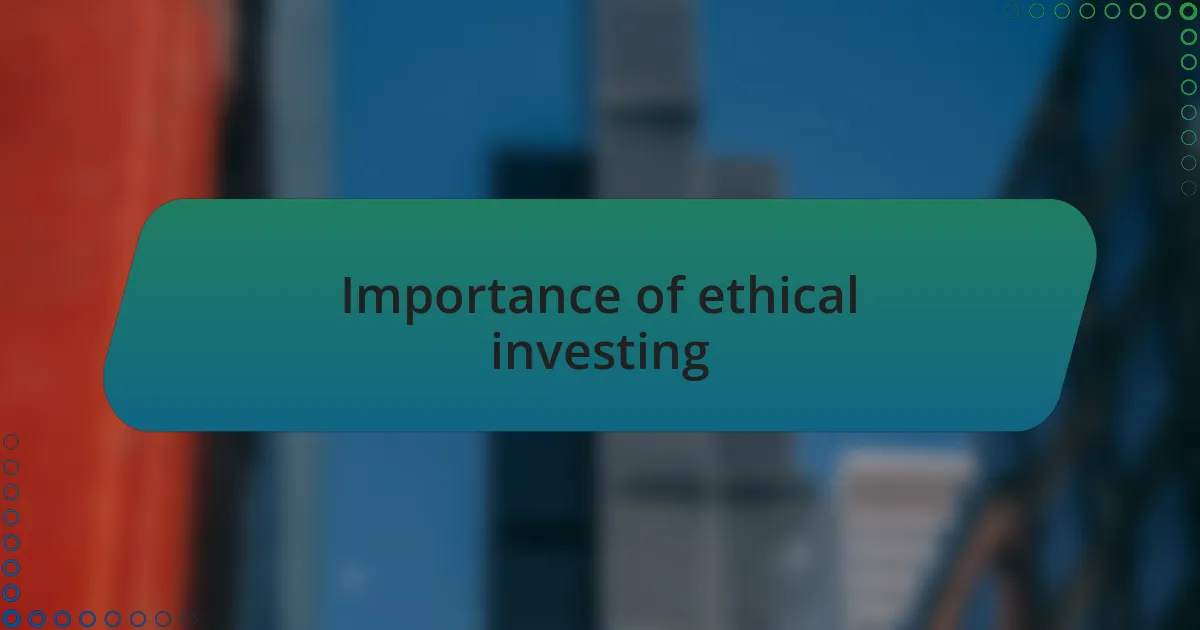
Importance of ethical investing
Investing ethically goes beyond just the money; it’s about fostering a future where our financial choices reflect our beliefs. I once had a client who felt a deep connection to environmental causes but was unsure how that aligned with her investment portfolio. Guiding her through the process of selecting sustainable companies was a transformative experience, showcasing how wealth can support a healthier planet. Don’t you think it’s empowering to know your investments can align with your values?
Another significant aspect is the potential for long-term financial performance. Many investors often wonder if ethical choices mean sacrificing returns. I recall analyzing the financials of a solar energy company, which turned out to be not just ethically sound but financially robust as well. Isn’t it encouraging to see that doing good can also be smart financially?
Lastly, ethical investing is crucial in driving corporate behavior change. When investors prioritize companies with strong ethical practices, they send a message that these values matter. I have personally witnessed companies shift their strategies in response to increased demand for social responsibility, proving that our collective voice can influence the market. Have you ever considered the power you hold as an investor to impact not just your financial future, but also societal norms?
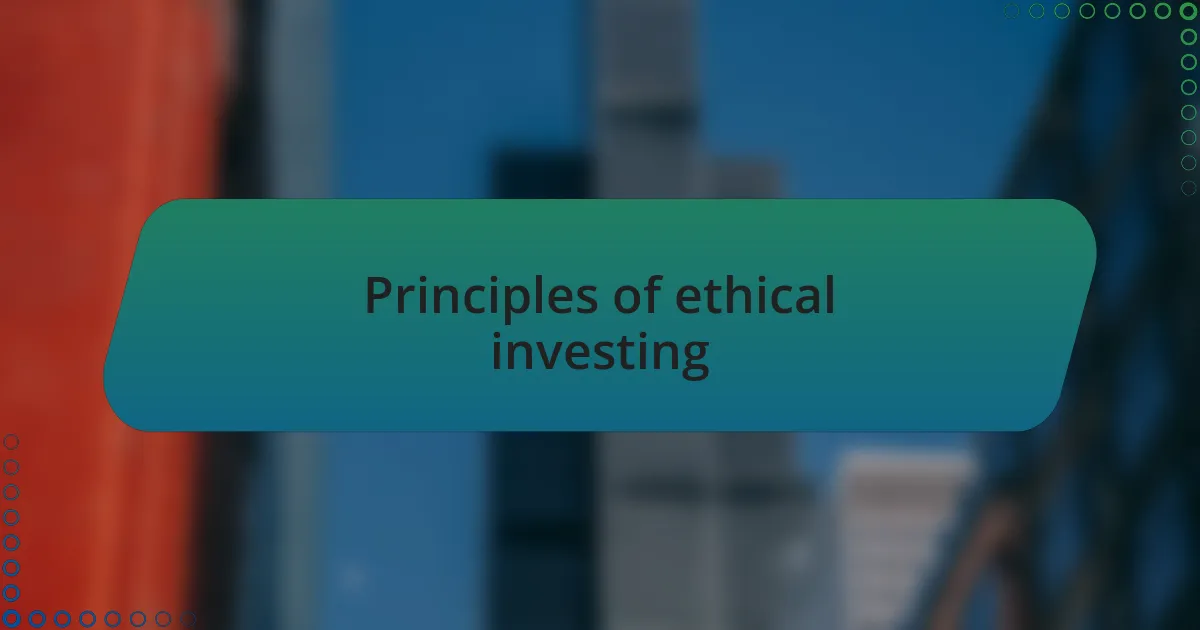
Principles of ethical investing
When it comes to ethical investing, one of the core principles is the commitment to sustainability. I remember attending a seminar where industry experts discussed the importance of balancing profit with planet. That moment stuck with me, as I realized that choosing investments in companies that prioritize environmental sustainability not only supports healthier ecosystems but often leads to innovative solutions that can result in strong financial growth. Aren’t we all looking for ways to leave a positive mark on the world?
Another essential principle revolves around social responsibility. It’s about investing in companies that champion diversity, equity, and employee welfare. I once had the opportunity to collaborate with a firm that implemented above-average employee benefits, resulting in higher morale and productivity. Observing the positive outcomes, I couldn’t help but think, why wouldn’t investors want to support businesses that foster such uplifting environments?
Lastly, transparency plays a pivotal role in ethical investing. It’s important to seek out companies that openly share their practices and impact, allowing us to make informed decisions. I vividly remember working with a startup that made its sustainability report accessible to all stakeholders. This transparency not only built trust with investors but also showcased their commitment to ethical practices. Shouldn’t every investor demand clarity about where their money is going?
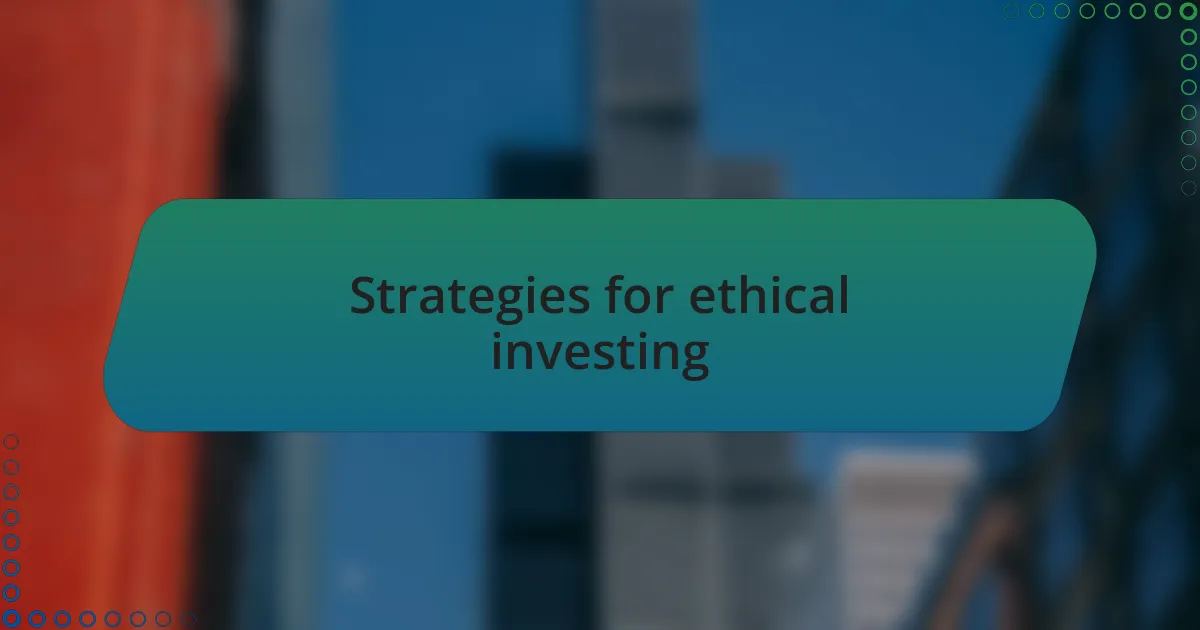
Strategies for ethical investing
One effective strategy for ethical investing is to incorporate an Environmental, Social, and Governance (ESG) framework into your decision-making process. I remember reviewing a portfolio that had significant holdings in renewable energy companies. Seeing the tangible impact these investments had on both the environment and community engagement ignited my passion for this approach. Could there be a more fulfilling way to invest than knowing your money promotes positive change?
Another strategy involves actively engaging in shareholder advocacy. I once participated in a shareholder meeting to discuss a company’s labor practices. The experience opened my eyes to how powerful collective voices can be in driving corporate accountability. It made me wonder, if we don’t speak up, how can we expect companies to align with our ethical standards?
Lastly, I’ve found that setting a clear personal investment mandate can help refine your ethical investment choices. By defining what matters most to you—whether it’s climate change, human rights, or corporate governance—you create a guideline that keeps your investments aligned with your values. I often ask fellow investors if they have articulated their values and seen how that clarity can simplify decision-making. How might your investment landscape shift by understanding what truly resonates with you?
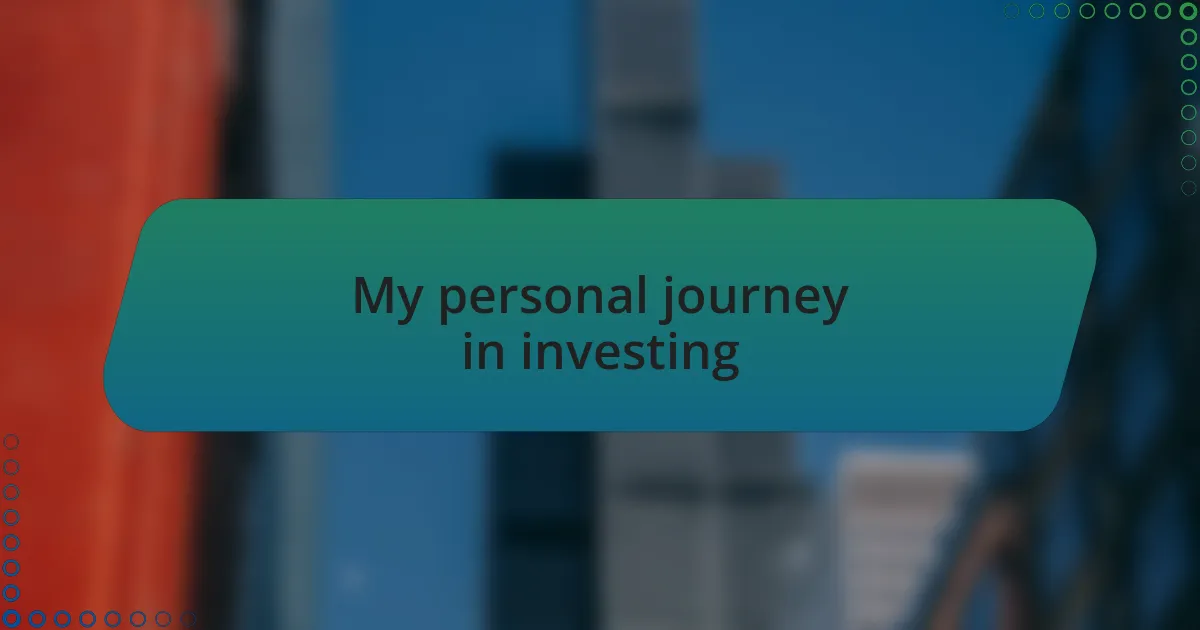
My personal journey in investing
As I reflect on my journey in investing, I can’t help but remember the early days when I was primarily focused on traditional financial metrics. It wasn’t until I stumbled upon a documentary highlighting the effects of unethical investments on local communities that my perspective shifted dramatically. That moment made me realize investing isn’t just about numbers; it’s about the broader impact of my choices.
One memorable turning point was when I decided to divest from companies with questionable practices. I felt a mix of anxiety and exhilaration as I reassessed my portfolio. Would I sacrifice returns for my beliefs? Yet, as I embraced this more aligned approach, I found that my returns were not only competitive but often exceeded my expectations, reinforcing my conviction that ethical investing can indeed lead to both financial and social fulfillment.
The most compelling aspect of my investing journey has been the conversations I’ve had with like-minded individuals. When a friend shared their experience in supporting seasoned investors who advocate for ethical practices, I was inspired to join community initiatives. Engaging with others has deepened my understanding and broadened my perspective. I often wonder, how many opportunities for meaningful dialogue might we miss in this pursuit, and how could they enrich our investment philosophies?
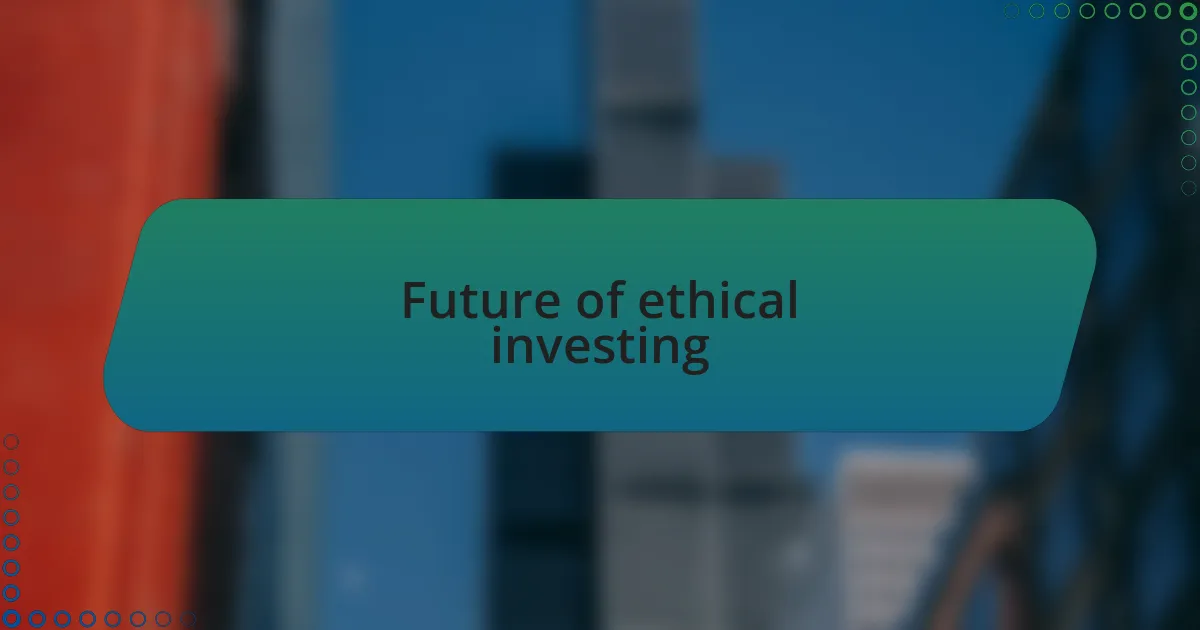
Future of ethical investing
The future of ethical investing is poised for significant growth, driven by an increasing awareness of social and environmental issues. I often find myself amazed by the conversations I have with fellow investors who are excited about the potential to create a positive impact alongside financial returns. It’s fascinating to consider how a collective shift in values can influence market trends and push companies to adopt more responsible practices.
As I navigate this evolving landscape, I can’t help but feel a sense of hope. More investors are prioritizing sustainability, and I’ve seen a remarkable rise in funds dedicated to green technologies and social justice initiatives. It leads me to wonder: could we be on the brink of a new investment paradigm where ethical considerations become the norm rather than the exception?
Moreover, I’m struck by the younger generations who are vocal about their expectations for corporate accountability. Witnessing their passion inspires me to remain vigilant in my investment choices. I sometimes think about how this momentum might reshape entire industries, and it excites me to imagine the possibilities for financial innovation that aligns with our shared values.






